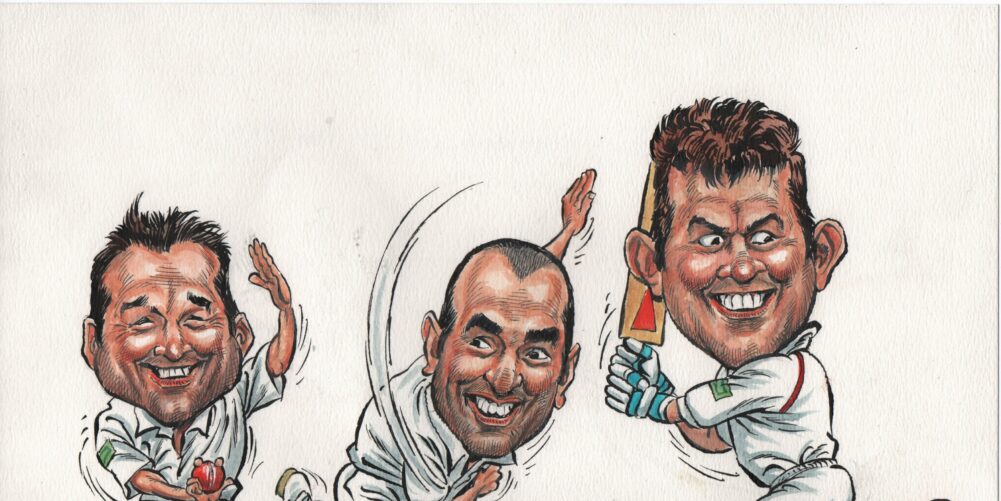While they did not win the Championship in 2001, Somerset’s spirit won them plenty of friends. Paul Edwards remembers the Taunton boys fondly…
Outposts are different; they acquire a distinct character and they can come to represent more than themselves. This seems to me as true in cricket as in wider worlds and perhaps it helps explain why Somerset are so many people’s second favourite team.
The medium pace bowler, Tom Cartwright, joined the county from Warwickshire and his words still ring true. “Somerset had a great appeal to me,” he said. “The cricket was closer to the community than it had become at Edgbaston. And Somerset people are fairly down to earth. They’re not over-impressed by flannel.”
Yet despite winning five limited-overs competitions between 1979 and 1983, Somerset have never won the County Championship. Indeed, they have been runners-up on only four occasions, all of them in this century. I witnessed the climax of two of those second-place finishes and I remember them more clearly than some other counties’ facile triumphs.
The first occurred at Old Trafford on the final evening of the 2010 season, when all that Lancashire’s batsmen had to do was avoid losing three wickets in 18 overs against Nottinghamshire to leave Somerset with their maiden title. For all the mutterings in the Mendips, that was easier said than done against Ryan Sidebottom and André Adams in full sail, and Lancashire duly failed to do it.
Karl Brown, Mark Chilton and Shivnarine Chanderpaul all nicked catches. “He’s caught it!” exclaimed Christopher Martin-Jenkins to no one in particular when Samit Patel held on to that last edge. Nottinghamshire took the title because they had won one more game than Somerset and their exultant players raced around the outfield manically. A hundred miles away at Chester-le-Street, Marcus Trescothick and his men heard the news, as did some 300 of their supporters. CMJ, for all the copy he had to file about the new champions for The Times, spared more than a line of consolation for Somerset. I watched the champagne being sprayed at Old Trafford and thought of the silence at the Riverside.
There were considerably more than 300 people at Taunton’s County Ground on the final day of last season. If you added together all the folk gathered in the pavilions – Somerset, being Somerset, has four such structures – I reckon there were about 1,000 loyalists on the ground. They had turned up to share fellowship as they watched the final day of Middlesex’s match against Yorkshire on TV. They hoped, against all reason and cricketing logic, that the game at Lord’s might end in a draw or even a tie, the only results that could leave Somerset where they had begun the day – at the top of the Division One table.
Watching the faces in the Stragglers’ café as Middlesex strengthened their grip on the title, one was reminded that however many old buildings Somerset’s officials choose, for the best of reasons, to knock down, the essential character of the ground has remained miraculously the same. For that character is made by people as much as by bricks, cement and old photographs, and the enthusiasm for cricket in Taunton is unmatched by that at any other town in England, with the possible exception of Scarborough during the Festival. One has only to visit the cafés in Bath Place or the Ring Of Bells in St James Street to find people talking about the game that is taking place a few hundred yards away.
This sense of community has helped sustain Somerset through the bad times on the field, and even through the civil war that convulsed the club in the mid 1980s. It has enabled Somerset supporters to enjoy their team’s seven one-day trophy wins and to console each other when the championship eludes them; rather as it did in 2001 when a side few had reckoned capable of winning the title came within 16 points of doing so.

“By general agreement, certainly in every parish across the Mendips and the Quantocks, Somerset’s season was the best in their variegated history,” wrote David Foot in the 2002 Wisden. “Perhaps there were more flash, pulsating days when players of mighty individual talent such as Botham, Richards and Garner were around… But 2001 was better, a more balanced triumph from lesser souls.” Foot was reviewing a summer in which Somerset had not only finished runners-up in the Championship for the first time in their history, but had won the Cheltenham and Gloucester Trophy when they defeated Leicestershire by 41 runs at Lord’s.
There was more to it than winners’ medals, though. In 2001, Somerset’s centrally-contracted players, Marcus Trescothick and Andrew Caddick, were restricted to five Championship games between them. Trescothick still managed to chip in with a century and Caddick with 18 wickets, yet their absence only inspired other players to fill the breach. The county’s Tasmanian skipper, Jamie Cox, enjoyed his best season as captain and was the only Somerset batsman to score a 1,000 runs in the Championship. For all that he had to wait until September for his only century. Many of Cox’s nine fifties were made at crucial times in games that were in the hazard. “His simple, pure style of batting was a delight to behold,” wrote Vic Marks. “Few players have pummelled the off-side boundaries at Taunton with such elegance.”
Cox never played Test cricket, but he was an excellent illustration of Somerset’s ability to attract little-known or unlikely overseas players who proceeded to play far beyond most people’s expectations. This, after all, was the county for whom Bill Alley made his Championship debut, aged 38, in 1957 and Taunton was where a 19-year-old Greg Chappell came to learn about English wickets. Cox was the latest in an honourable line and he was determined in his quiet way to get the best out of a team which featured more foot soldiers than knights in burnished armour.
Apart from Cox, the batting was led by Mike Burns, whose 893 runs included 221 in the draw against Yorkshire at Bath. “Burns was the kind of occupant of the dressing room to give other players the right sense of perspective,” wrote Foot in Sixty Summers. “When morale was low, he told them they were lucky to be in employment. Once he worked as a shipyard fitter in his native Barrow… then came a few winters on the dole… When major construction was being carried out at the county ground in Taunton, he volunteered for an unglamorous labouring job.”
The uncomplicated approach of Cox and Burns was followed by their team mates. Peter Bowler made 799 runs and Ian Blackwell, originally recruited from Derbyshire in 2000 as a left-arm spinner, whacked four Championship hundreds to reinforce his claims to be an all-rounder. This, though, is so often the way of things in Somerset. They produce their own players, recruit young overseas cricketers and revive careers that have flagged at other counties.
The bowling attack in 2001 exemplified these traits. The seamer Richard Johnson and the off-spinner Keith Dutch were both persuaded to head west from Middlesex by the new coach, Kevin Shine.
Johnson, then two years away from making his Test debut, took 62 wickets and Dutch’s slow bowling accounted for 35 batsmen. Both made useful runs. In a similar fashion, Llanelli-born seamer Steffan Jones enjoyed his best season at Somerset in 2001, taking 59 wickets and filling the dressing room with unquenchable enthusiasm.
“There is too much emphasis on technique and all that rubbish,” said the splendidly unconventional Jones, a fitness enthusiast who had converted his Taunton garage into a gym. “Coaches should leave
players alone to develop their own methods. Flair and individualism should not be stifled.”
This mix of talents brought Somerset six notable victories in 2001. Caddick’s ten wickets helped his side defeat Yorkshire by ten wickets at Leeds and a typically determined team effort set up a ten-wicket victory over Lancashire at Old Trafford. Throughout the summer, Cox and his players continued to confound those who could not believe they were still in contention.
Ultimately, though, at least as far as the Championship was concerned, it was not quite enough. When David Byas caught Simon Jones off Darren Lehmann at Scarborough he sealed Yorkshire’s 30th title and denied Somerset their first.
Outside the West Country, you might do well these days to find people capable of naming too many of Cox’s ‘nearly men’ of 2001. In the Poldens or the Blackdowns, however, there are probably plenty who are able to recall one of the most wholehearted teams in the county’s history.
“In the long view it is not the arithmetical performances of this or that player, not merely the times of success or failure that strike the historian of Somerset cricket,” wrote R C Robertson-Glasgow in a distant age. “It is rather the spirit – the spirit which, win or lose, has always been a happy compound of humour and independence.”
What Cox and his players managed in 2001 was to take that spirit, add the necessary professionalism to it and produce performances which surprised those who believed the title was bound to go almost anywhere, but Taunton.
This article originally appeared in The Cricket Paper on Friday 20th January. Subscribe to The Cricket Paper here.















